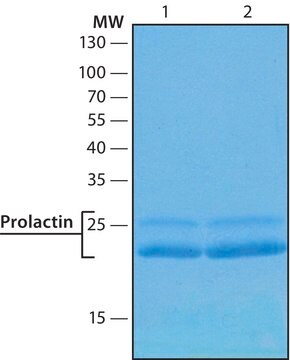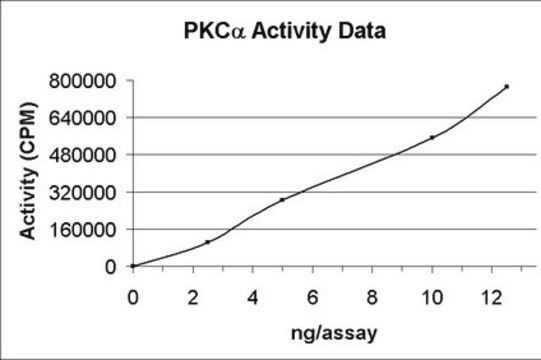P1782
Protein kinase Cα isozyme human
≥70% (SDS-PAGE), recombinant, expressed in baculovirus infected insect cells, buffered aqueous glycerol solution
Synonym(s):
PKCα
About This Item
Recommended Products
recombinant
expressed in baculovirus infected insect cells
Quality Level
Assay
≥70% (SDS-PAGE)
form
buffered aqueous glycerol solution
specific activity
≥250 units/μg protein
mol wt
80-81 kDa by SDS-PAGE
UniProt accession no.
shipped in
dry ice
storage temp.
−70°C
Gene Information
human ... PRKCA(5578)
Biochem/physiol Actions
Phosphorylation appears to be an important mechanism of regulation of all PKCs. PKC plays a role in the regulation of cell transformation, growth, differentiation, ruffling, vesicle trafficking, apoptosis and gene expression.
Unit Definition
Physical form
Storage Class Code
10 - Combustible liquids
WGK
WGK 1
Flash Point(F)
Not applicable
Flash Point(C)
Not applicable
Personal Protective Equipment
Regulatory Listings
Regulatory Listings are mainly provided for chemical products. Only limited information can be provided here for non-chemical products. No entry means none of the components are listed. It is the user’s obligation to ensure the safe and legal use of the product.
Cartagena Act
Cartagena Act Listed
JAN Code
P1782-BULK:
P1782-VAR:
P1782-5UG:
P1782-20UG:
Certificates of Analysis (COA)
Search for Certificates of Analysis (COA) by entering the products Lot/Batch Number. Lot and Batch Numbers can be found on a product’s label following the words ‘Lot’ or ‘Batch’.
Already Own This Product?
Find documentation for the products that you have recently purchased in the Document Library.
Our team of scientists has experience in all areas of research including Life Science, Material Science, Chemical Synthesis, Chromatography, Analytical and many others.
Contact Technical Service






